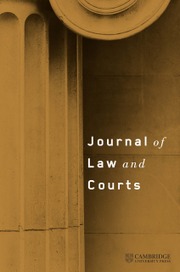Article contents
Judicial Selection and the Democratization of Justice
Lessons from the Bolivian Judicial Elections
Published online by Cambridge University Press: 21 October 2022
Abstract
In 2011, Bolivia became the first modern country to directly elect national judges. Reformers heralded the adoption of judicial elections as a “democratization of justice,” by which institutional independence would be assured, public confidence in the judiciary might be expanded, and various maladies of the judicial system would find resolution. We evaluate the elections in light of these objectives. We show candidates were advantaged when voters shared their partisan and demographic traits, resulting in unprecedented diversity on the national courts. Also, public confidence in the judiciary increased among government supporters but declined overall. We offer preliminary reflections for would-be reformers.
- Type
- Research Article
- Information
- Copyright
- © 2015 by the Law and Courts Organized Section of the American Political Science Association. All rights reserved.
Footnotes
The authors would like to thank the Latin American Public Opinion Project (LAPOP) and its major supporters (the United States Agency for International Development, the United Nations Development Program, the Inter-American Development Bank, and Vanderbilt University) for making the data available. The authors would also like to thank Matt Gabel, Andrew D. Martin, Keith Schnakenberg, Constanza Schibber, Alicia Uribe, Quintin H. Beazer, Chris Reenock, Dave Klein, anonymous reviewers, and seminar participants at Florida State University for helpful comments. Nicolas Dumas, James Boyce, Casey Delehanty, Kevin Fahey, Eliana Wilk and Juliee Conde Medina provided excellent research assistance. Data and code for replication purposes are available at the authors’ websites.
References
- 12
- Cited by


